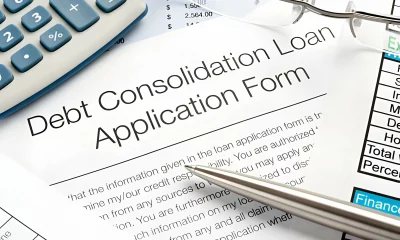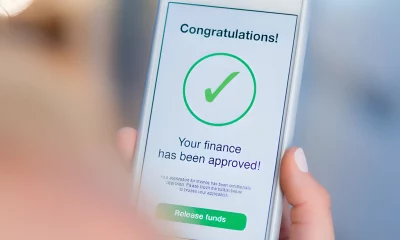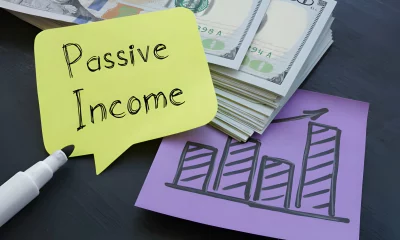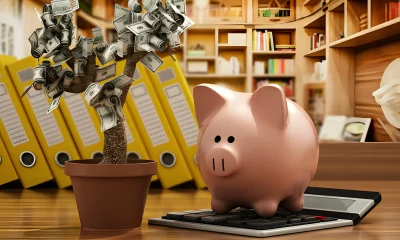Top 10 Best Loans for Bad Credit in January 2025
Looking to secure a loan but struggling with bad credit? Don’t fret! We’ve got you covered. In this listicle, we’ll unveil the top options that cater specifically to individuals with less-than-perfect credit scores. From flexible repayment terms to competitive interest rates, these loans are designed to help you get the financial assistance you need without the hassle.
Discover which lenders offer quick approval processes, minimal paperwork requirements, and opportunities for credit improvement. Whether you’re in need of a personal loan or looking to consolidate debt, our curated selection will guide you towards finding the best loans tailored for those with bad credit histories. Scroll down for reviews of our top picks!
1. Secured Personal Loans
Secured personal loans are a viable option for individuals with bad credit looking to secure financing. By requiring collateral, these loans offer lower interest rates compared to unsecured options, making them more accessible for those in need of financial assistance. Moreover, utilizing a secured personal loan can aid in building or improving one’s credit history over time.
- Requires Collateral: To obtain approval for a secured personal loan, borrowers must provide collateral such as a car or savings account.
- Lower Interest Rates: Due to the reduced risk for lenders when collateral is involved, secured loans typically come with lower interest rates than unsecured alternatives.
- Credit History Building: Regular and timely payments on a secured personal loan can positively impact an individual’s credit score, demonstrating responsible financial behavior.
2. Credit Union Loans
Credit union loans stand out for their lower interest rates and fees compared to traditional banks. This can translate into significant savings over the life of the loan, making them an attractive option for those with bad credit looking to borrow money. Credit unions often offer more flexible repayment terms, allowing borrowers to tailor their payments to fit their financial situation better.
One thing to note is that accessing credit union loans may require membership in the specific credit union offering the loan. While this might seem like an extra step, becoming a member can be worthwhile due to the potentially more favorable loan terms available through these institutions. By joining a credit union and taking advantage of their loan products, individuals with bad credit can access funds while also benefiting from lower costs and friendlier repayment conditions.
3. Peer-to-Peer Lending
Peer-to-peer lending allows you to borrow directly from individuals through online platforms, cutting out traditional financial institutions. This method can be advantageous for those with bad credit as it often has more lenient credit requirements compared to banks or credit unions.
One significant benefit of peer-to-peer lending is the potential for competitive interest rates. Since these platforms connect borrowers and lenders directly, they can offer rates that are sometimes lower than what traditional lenders provide. This can translate into cost savings over the life of the loan.
Moreover, peer-to-peer lending offers a more personalized borrowing experience. Instead of dealing with a large bank where decisions are based solely on algorithms and strict criteria, peer-to-peer platforms may take a more holistic view of your financial situation. This human touch can lead to better terms and increased flexibility in repayment options.
4. Payday Alternative Loans (PALs)
Payday Alternative Loans (PALs) are a valuable option for individuals with bad credit in need of short-term funds. These loans, typically offered by credit unions, serve as a more affordable substitute to traditional payday loans.
- PALs come with lower interest rates and fees compared to standard payday loans, making them a financially sound choice for borrowers looking to avoid the high costs associated with payday lending.
- Designed specifically for short-term borrowing needs, PALs provide quick access to cash without trapping borrowers in long cycles of debt accumulation often seen with other types of short-term financing options.
Credit unions that offer PALs adhere to strict guidelines set by the National Credit Union Administration (NCUA), ensuring fair terms and conditions for borrowers. By opting for a PAL instead of a conventional payday loan, individuals can secure the necessary funds without falling prey to exorbitant interest rates and hidden charges commonly found in the payday lending industry.
5. Bad Credit Personal Loans
- Tailored for individuals with bad credit scores to access financing.
- Typically come with higher interest rates due to the elevated risk for lenders.
- Repaying these loans on time can assist in improving a low credit score.
Bad credit personal loans offer a lifeline to those struggling with poor credit, providing an avenue for obtaining much-needed funds. While they may entail higher costs through increased interest rates, they serve as a valuable tool for rebuilding damaged credit profiles. By making timely repayments on these loans, borrowers can demonstrate financial responsibility and gradually enhance their creditworthiness.
These specialized loan products cater specifically to individuals facing challenges due to low credit scores, offering them opportunities that might be otherwise unavailable from traditional lenders. Despite the associated higher costs, bad credit personal loans play a crucial role in empowering people to address their financial needs and work towards bettering their overall financial health.
In essence, bad credit personal loans act as stepping stones toward regaining financial stability by providing access to essential funds while simultaneously paving the way for improved future borrowing options through diligent repayment practices.
6. Home Equity Loans for Bad Credit
Using your home equity as collateral can be a strategic move when seeking a loan despite having bad credit. By leveraging this valuable asset, borrowers gain access to funds at more favorable interest rates compared to unsecured loans.
This type of loan is particularly beneficial for individuals with poor credit scores who may struggle to secure financing through traditional means. It offers them an opportunity to tap into their home’s equity and obtain the necessary funds while potentially rebuilding their credit history through timely repayments.
However, it’s crucial to acknowledge the inherent risk associated with home equity loans for bad credit. Failure to meet repayment obligations could lead to foreclosure on your property, putting your homeownership in jeopardy.
In essence, while home equity loans offer a viable solution for those with bad credit looking for lower-cost borrowing options, it’s essential to carefully assess your financial situation before committing to such an arrangement. Balancing the benefits against the risks is key in making an informed decision that aligns with your long-term financial goals and stability.
7. Online Lenders Specializing in Bad Credit Loans
Online lenders focusing on bad credit loans cater to individuals with a poor credit history, offering them financial solutions that traditional banks might not provide. The application process is quick and convenient, often requiring minimal documentation compared to conventional loan applications.
These lenders usually charge higher interest rates due to the increased risk they undertake by lending to individuals with bad credit scores. This compensates for the potential default on repayments. Despite this drawback, these online lenders can be a lifeline for those who have limited options.
While some of these lenders may fall into the category of predatory lenders, not all online platforms specializing in bad credit loans engage in unfair practices. It’s essential for borrowers to research and choose reputable online lenders that operate within legal boundaries and offer transparent terms and conditions.
8. Co-signed Loans
Co-signed loans require a co-signer with good credit to guarantee the loan, increasing the chances of approval for individuals with bad credit. Having a co-signer can support the borrower in securing better loan terms and lower interest rates compared to what they would qualify for independently.
If the borrower fails to make payments on time or defaults on the loan, the co-signer becomes responsible for repayment. This setup not only benefits the borrower by potentially improving their approval odds but also provides a safety net for lenders, reducing their risk when offering loans to individuals with less-than-ideal credit histories.
Co-signed loans can be an excellent option for those looking to build or repair their credit over time while accessing necessary funds. However, it’s crucial for both parties involved—the borrower and the co-signer—to fully understand their responsibilities and obligations before entering into this financial arrangement.
9. Installment Loans for Bad Credit
Installment loans for bad credit are structured to be repaid in fixed monthly installments over a predetermined period. These loans can typically be secured from online lenders or credit unions, offering individuals with poor credit histories a chance to access necessary funds.
These installment loans serve as an opportunity for borrowers to demonstrate responsible financial behavior by making timely payments each month. By consistently paying on time, individuals can gradually rebuild their credit scores and establish a positive payment history.
Moreover, installment loans for bad credit often come with clear terms and conditions, making it easier for borrowers to budget effectively since they know the exact amount due each month. This predictability aids in financial planning and reduces the risk of late payments that could further damage one’s credit standing.
In essence, opting for installment loans when dealing with bad credit provides not only the needed financial assistance but also a platform to improve one’s overall creditworthiness through disciplined repayment habits.
10. Cash Advances from Credit Cards
Cash advances from credit cards offer a way to access cash by borrowing against your credit card limit. However, it’s crucial to consider the following points before opting for this option:
- High-Interest Rates: Cash advances typically come with high-interest rates compared to regular purchases made on a credit card.
- Additional Fees: In addition to interest charges, there may be extra fees associated with cash advances, making them an expensive form of borrowing.
- Last Resort Option: Due to the costly nature of cash advances, it is advisable to use them as a last resort when facing urgent financial needs and after exploring other more affordable loan options.
When considering a cash advance from your credit card, ensure you fully understand the terms and costs involved. It’s essential to weigh the convenience of quick access to funds against the potential long-term financial implications.
Remember that responsible borrowing practices are key in managing your finances effectively and avoiding falling into debt traps often associated with high-cost borrowing methods like cash advances from credit cards.
Closing Thoughts
You’ve now uncovered a range of options for securing loans with bad credit. From secured personal loans to credit union loans and online lenders specializing in bad credit, the financial world offers avenues to explore. Remember, each choice comes with its own set of pros and cons, so it’s crucial to weigh them carefully before making a decision. Your financial journey is unique, and finding the right loan can make all the difference.
As you navigate the realm of bad credit loans, keep in mind that taking proactive steps to improve your credit score can open up even more opportunities in the future. By making timely payments and managing your finances wisely, you can gradually enhance your financial standing. Stay informed, stay vigilant, and remember that there’s always a way forward.
Frequently Asked Questions
Can I get a loan if I have bad credit?
Yes, you can still be eligible for certain types of loans even with bad credit. Options like secured personal loans or peer-to-peer lending cater to individuals with less-than-perfect credit scores.
What are the benefits of Credit Union Loans for bad credit?
Credit union loans often offer more flexible terms and lower interest rates compared to traditional banks. They focus on helping members improve their financial well-being, making them a good option for those with bad credit.
How do Co-signed Loans work for individuals with bad credit?
Co-signed loans involve having someone with good credit co-sign the loan agreement. This person acts as a guarantor, providing assurance to the lender that the loan will be repaid, which can help secure better terms despite your bad credit history.
Are there specific requirements for applying for Bad Credit Personal Loans?
While requirements vary among lenders, most may look at factors beyond just your credit score when considering your application. These could include income stability, employment status, and overall financial situation to assess your ability to repay the loan.
What should I consider before opting for Home Equity Loans for Bad Credit?
Home equity loans use your home as collateral and come with risks such as potential foreclosure if you default on payments. Assess whether you can afford the repayment schedule and explore other options before choosing this route.






















